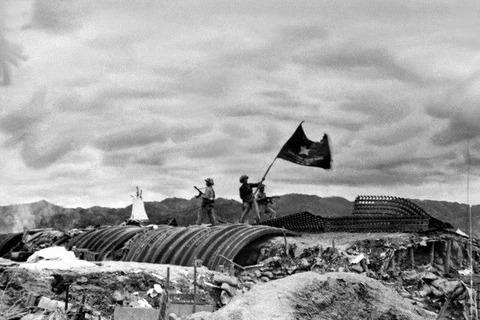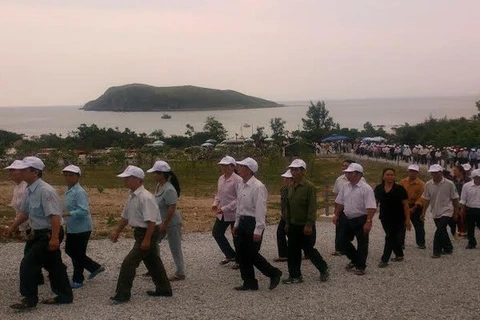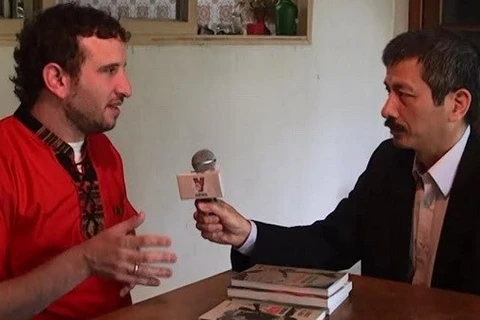 One day after the Dien Bien Phu Victory, the Geneva Conference on termination of wars and restoring peace in Indochina opened in Geneva, Switzerland on May 8, 1954 (Photo: VNA)
One day after the Dien Bien Phu Victory, the Geneva Conference on termination of wars and restoring peace in Indochina opened in Geneva, Switzerland on May 8, 1954 (Photo: VNA)  Vietnamese delegation, led by Deputy Prime Minister Pham Van Dong, arrives in Geneva to attend the Geneva Conference, May 4, 1954 (Photo: VNA)
Vietnamese delegation, led by Deputy Prime Minister Pham Van Dong, arrives in Geneva to attend the Geneva Conference, May 4, 1954 (Photo: VNA)  Right from the day the conference started, the Vietnamese delegation implemented proactive diplomacy and international mobilization (Photo: VNA)
Right from the day the conference started, the Vietnamese delegation implemented proactive diplomacy and international mobilization (Photo: VNA)  In parallel with the struggles on the negotiating table, Vietnam actively worked with the Soviet Union, China and France, organising press conferences and holding meetings with hundreds of French social organisations and political circles to express Vietnam’s goodwill and determination, in addition to combatting the aggression and conspiracy of enemy forces (Photo: VNA)
In parallel with the struggles on the negotiating table, Vietnam actively worked with the Soviet Union, China and France, organising press conferences and holding meetings with hundreds of French social organisations and political circles to express Vietnam’s goodwill and determination, in addition to combatting the aggression and conspiracy of enemy forces (Photo: VNA)  These activities turned the French and international public opinion in favour of Vietnam’s stance, forcing the French government to adopt a plan of comprehensive solutions for Vietnam and Indochina (Photo: VNA)
These activities turned the French and international public opinion in favour of Vietnam’s stance, forcing the French government to adopt a plan of comprehensive solutions for Vietnam and Indochina (Photo: VNA)  Deputy Prime Minister Pham Van Dong (R) and Foreign Minister of Soviet Union Vyacheslav Molotov (L) at the opening ceremony of the Geneva Conference, May 8, 1954 (Photo: VNA)
Deputy Prime Minister Pham Van Dong (R) and Foreign Minister of Soviet Union Vyacheslav Molotov (L) at the opening ceremony of the Geneva Conference, May 8, 1954 (Photo: VNA)  Deputy Prime Minister Pham Van Dong (L) and Chinese Premier Zhou Enlai (R) at the opening ceremony of the Geneva Conference, May 8, 1954 (Photo: VNA)
Deputy Prime Minister Pham Van Dong (L) and Chinese Premier Zhou Enlai (R) at the opening ceremony of the Geneva Conference, May 8, 1954 (Photo: VNA)  The Geneva Agreement ending hostilities in Vietnam, Laos and Cambodia, is signed after 75 days of negotiations, with over eight overall sessions and 23 meetings, along with a range of informal diplomatic activities, July 20, 1954 (Photo: VNA)
The Geneva Agreement ending hostilities in Vietnam, Laos and Cambodia, is signed after 75 days of negotiations, with over eight overall sessions and 23 meetings, along with a range of informal diplomatic activities, July 20, 1954 (Photo: VNA)  The accords brought an end to the French colonial system and encouraged people from Asia, Africa and Latin America to fight for national liberation (Photo: VNA)
The accords brought an end to the French colonial system and encouraged people from Asia, Africa and Latin America to fight for national liberation (Photo: VNA)  Since the victory in Geneva, Vietnam has gone through many stages of history, putting the country firmly on the path of development, industrialisation, modernisation and international integration (Photo: VNA)
Since the victory in Geneva, Vietnam has gone through many stages of history, putting the country firmly on the path of development, industrialisation, modernisation and international integration (Photo: VNA) VNA
























